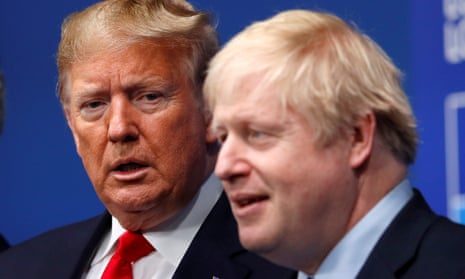Donald Trump’s propensity for bullying people is well-known. The US president frequently resorts to threats, insults, heavyhanded pressure tactics and disproportionate retaliation to get his own way. Boris Johnson, a supposed Trump chum, now finds himself on the receiving end in respect of several bilateral disputes, actual or incipient. How Johnson deals with this unpleasant behaviour, and the extent of his willingness to defy Trump, is emerging as a key early test of his premiership.
Britain is evidently not alone among America’s allies in having its friendship and fidelity taken for granted. Trump has acted in coarse and offensive ways to the leaders of France and Germany, threatening both with arbitrary trade and financial sanctions as punishment for not doing his bidding. He was gratuitously rude about Johnson’s predecessor, Theresa May.
Trump sets the tone. The problem is that his bad manners and personal nastiness appear to have infected other US government officials, spreading into the far corners of his administration. Last week’s arrogant decision by Mike Pompeo, the US secretary of state, to summarily reject a British extradition request for Anne Sacoolas, an American woman accused of causing death by dangerous driving in Northamptonshire last year, is a case in point.
Pompeo is no diplomat. Like his boss, he has thuggish tendencies. In comparison, the foreign secretary, Dominic Raab, is calm and polite. He was only recently in Washington, papering over cracks caused by the illegal US assassination of Iran’s Qassem Suleimani. But even Raab was moved to condemn the Sacoolas decision as a “denial of justice” and demand an explanation from the US ambassador. Counter-measures should be considered, including a review of US citizens claiming diplomatic immunity in the UK.
More bullying, backed by self-defeating threats to curtail intelligence-sharing, characterises the US response to tentative suggestions by Johnson and other ministers that Britain may cut a deal with Huawei, the Chinese telecoms company blacklisted by the US. The advice from British security chiefs is that limited cooperation on building a 5G phone network would not pose a risk. Telecoms companies such as BT say Huawei is the best, most competitive choice.
A Huawei deal would bring investment, jobs and better value for British consumers. The US has failed to come up with persuasive alternatives. Nonetheless, an almost hysterical US lobbying campaign continues apace. Trump was on the phone to Johnson again on Friday, urging him to reconsider. US officials warn that signing up Huawei would be “nothing short of madness” and could “diminish the appetite” for a US-UK trade deal. Steven Mnuchin, US treasury secretary, will reinforce that message in London this weekend.
While the US concerns are understandable, and supported by partners such as Australia, they are overstated. They stem partly from paranoia over China’s rapid global rise and the two countries’ technological and trade rivalries. Meanwhile, the crude linkage made between the Huawei decision and a post-Brexit US trade deal carries a salutary warning for Johnson. Chum or not, Trump cannot be relied on to play straight or even sensibly. He fights dirty, and Britain can expect no favours from him.
Quite the contrary, in fact. Another US-UK row provided further evidence of a hostile, almost predatory pattern of US behaviour, apparently fuelled by perceptions of British weakness. This time the scrap was over long overdue plans for a 2% tax on digital giants such as Facebook, Google and Amazon. When the chancellor, Sajid Javid, vowed to press ahead, the US went off the deep end again, threatening punitive tariffs on British car exports.
Talk of introducing an internationally agreed digital tax is all very well – but it could take years to implement, and looks like a delaying tactic. Amazon and similar companies take large profits out of Britain. It is only right they should put more money back through fair and proportionate taxation. Ironically, Britain has the full backing of the EU’s competition commissioner, Margrethe Vestager. France caved in last week amid more US threats. Johnson must stick to his guns.
Britain’s Trump problem did not emerge overnight. It has been building for three years. British people strongly back attempts to combat the climate emergency. In this crucial political battle, Trump is the principal foe. Sensible UK attempts to sustain the 2015 Iran nuclear deal have been met with threats of yet more US sanctions. Next up, expect a demand that Britain betray the Palestinians and support Trump’s absurdly biased Middle East “peace plan”, which is expected to be unveiled within days.
The record of Trump’s anti-British strong-arming, insults and condescension is long and galling. Such behaviour is unacceptable. Have US officials forgotten that Britain is a sovereign country? Is their arrogance and contempt, channelling the White House, so great that they simply do not care? Maybe Trump believes that the prime minister is a pushover whose post-Brexit neediness outstrips his sense of national self-respect.
Perhaps he’s right. We hope not. Britain’s Trump problem is getting worse. Even Johnson’s 80-seat majority will not save him if he fails to take a stand.
